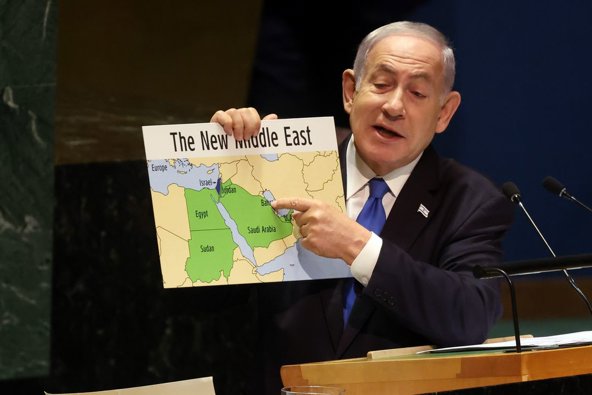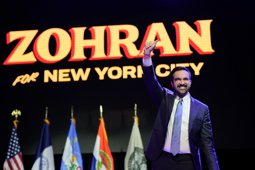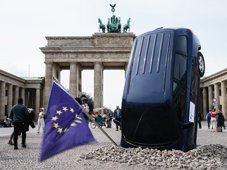
Netanyahu Rejects Two-State Plan in UN Showdown
In an intensely charged UN speech, Netanyahu refused a two-state solution and condemned Western recognitions of Palestine.
As Israeli Prime Minister Benjamin Netanyahu prepared to address the UN General Assembly in New York, intense speculation swirled around how his speech would frame Israel’s war in Gaza, the rising wave of Palestinian state recognitions abroad, and the broader prospects for a two-state solution. Preemptive tactics—like broadcasting his speech via loudspeakers into Gaza—added psychological and symbolic layers to what many viewed as a moment of diplomatic reckoning.Sources report that hundreds of delegates walked out of the assembly hall in protest as Netanyahu began his address, while others offered a standing ovation.
Sources report that hundreds of delegates walked out of the assembly hall in protest as Netanyahu began his address, while others offered a standing ovation.
Loudspeakers, Lecterns, and Battlefield Messaging
Broadcasting into Gaza: Tactical or Propaganda?
According to Haaretz and Ynet, Israeli military planning aimed to transmit Netanyahu’s UN speech into Gaza using loudspeakers mounted on trucks or near the border fence—an extension of psychological operations. While no official military confirmation surfaced before the address, the plan drew sharp criticism, especially from Israeli hostages’ families, who described it as emotional coercion in a tense conflict zone.
Balancing Domestic Politics with Global Audience
Netanyahu’s campaign to sway both sympathetic and skeptical international audiences was evident. He wore a pin with a QR code linking to material about the October 7 attack, publicly addressed Hamas via loudspeaker, and recast his speech as an appeal not just to UN delegates—but to embattled Israelis, global allies, and Gaza residents themselves.
Core Themes: Statehood, Conflict, and “Truths”
Rejecting a Palestinian State
One of the most consequential lines in Netanyahu’s address was his outright rejection of the two-state solution: “The Palestinians don’t believe in a two-state solution,” he argued, adding that past territorial concessions were met with renewed attacks. He framed the demand for a Palestinian state near Jerusalem as akin to granting Al Qaeda a territory after 9/11.
Condemning Western Recognition Moves
Netanyahu launched harsh critiques at countries like France, the UK, Australia, and Canada, accusing them of rewarding antisemitism by recognizing Palestinian statehood. He positioned these moves as emboldening terrorism and undermining Israel’s security narrative.
Framing the Conflict & War Logic
Consistent with prior speeches, Netanyahu painted the war as existential. He drew connections between Hamas, Iran, Hezbollah, and “terror networks” worldwide. He defended Israeli operations by claiming careful efforts to minimize civilian harm, denounced criticisms of disproportionate force, and accused critics of selective morality.
During the speech, delegates began leaving en masse—some before Netanyahu even spoke. The walkouts indicated how sharply his narrative has come under international scrutiny.
Global Reactions & Diplomatic Ripples
Walkouts, Backlashes, and Isolation
Netanyahu’s address triggered mass walkouts by dozens of delegations, signaling heightened global unease over Israel’s conduct in Gaza. He faced accusations of war crimes from aligned states, with growing momentum for sanctions and legal proceedings (including an ICC arrest warrant) intensifying diplomatic pressures.
Allies Under Strain
While the US maintained its backing, pressure mounted even there. Some Democratic and younger Republicans voiced unease over unrestricted support. Meanwhile, nations that recently recognized Palestine balked at Netanyahu’s rhetoric, with several demanding restraint or pause in annexation plans.
A Shifting Diplomatic Landscape
Netanyahu’s refusal of a two-state compromise, coupled with calls for annexation of the West Bank, threatens to reshape regional diplomacy. Analysts warn that his hardline positions may push moderate Arab states toward distancing themselves or conditional engagement. The global recognition of a Palestinian state by key Western nations underscores mounting divisions over Israel’s legitimacy in its current posture.
The Germany Case & Broader Symbolism
Although the original German article you provided focused on internal German dynamics (e.g. Bundestag debates, AfD critiques), this UN event has symbolic resonance across nations. In Germany—and elsewhere—political leaders and public opinion track how global institutions respond to the Israel-Palestine conflict. The German media, parliamentary debates, and public protests often reflect broader global discourse.
German parties (e.g. AfD, Left) frequently use Middle East events to frame domestic narratives on migration, security, and identity. In that light, Netanyahu’s UN appearance may influence debates not only in Israel and the Arab world but also in European capitals where foreign policy is hotly contested.
What Comes Next: Beyond Speeches
- United Nations follow-ups & resolutions: Expect new resolution drafts on ceasefire, humanitarian access, and probe mandates.
- War escalation or restraint: Whether Netanyahu maintains a hardline posture or signals willingness for negotiation will affect escalation dynamics.
- Judicial pressure & ICC: Netanyahu’s ICC warrant remains a specter—even if enforcement is politically fraught, it shapes international reception.
- Regional realignments: Arab states may recalibrate relations with Israel, especially if many see annexation as a red line.
- Public opinion & shocks: Media framing, protest movements, and hostage families’ responses may shift domestic politics across democracies watching this conflict with close attention.
Why broadcast the speech into Gaza?
That tactic was likely intended as psychological messaging—aimed at undermining Hamas morale, reinforcing Israel’s narrative, and signaling power. Critics argue it also weaponizes information toward civilians.
Do walkouts weaken the speech’s impact?
Yes—mass departures signal diplomatic rejection and diminish the symbolic unity of the forum. But Netanyahu’s target audience is broader: domestic Israelis, allies, and undecided global institutions.
Is rejection of a two-state solution irreversible?
Not necessarily from a diplomatic viewpoint—but the categorical rejection narrows options and increases polarization. Feasibility may depend on war outcomes, international pressure, and internal Israeli politics.
Will this reshape future UN diplomacy?
Possibly. The speech and its fallout may prompt sharper divisions in voting blocs, demands for stronger accountability mechanisms, and new configurations of alliance around Gaza and Palestine issues.
Sources: Associated Press Reuters Washington Post Jewish Press Guardian coverage






